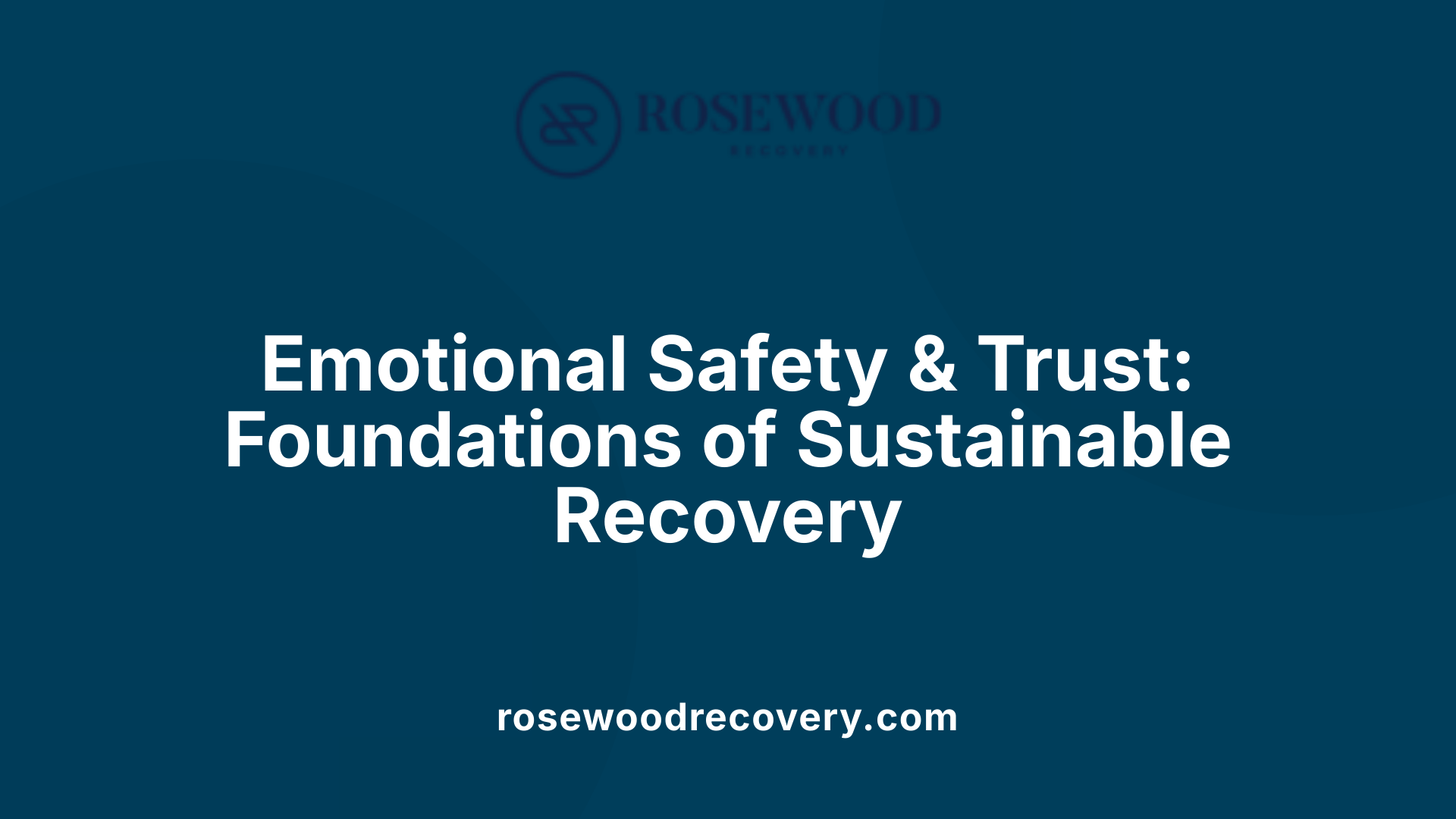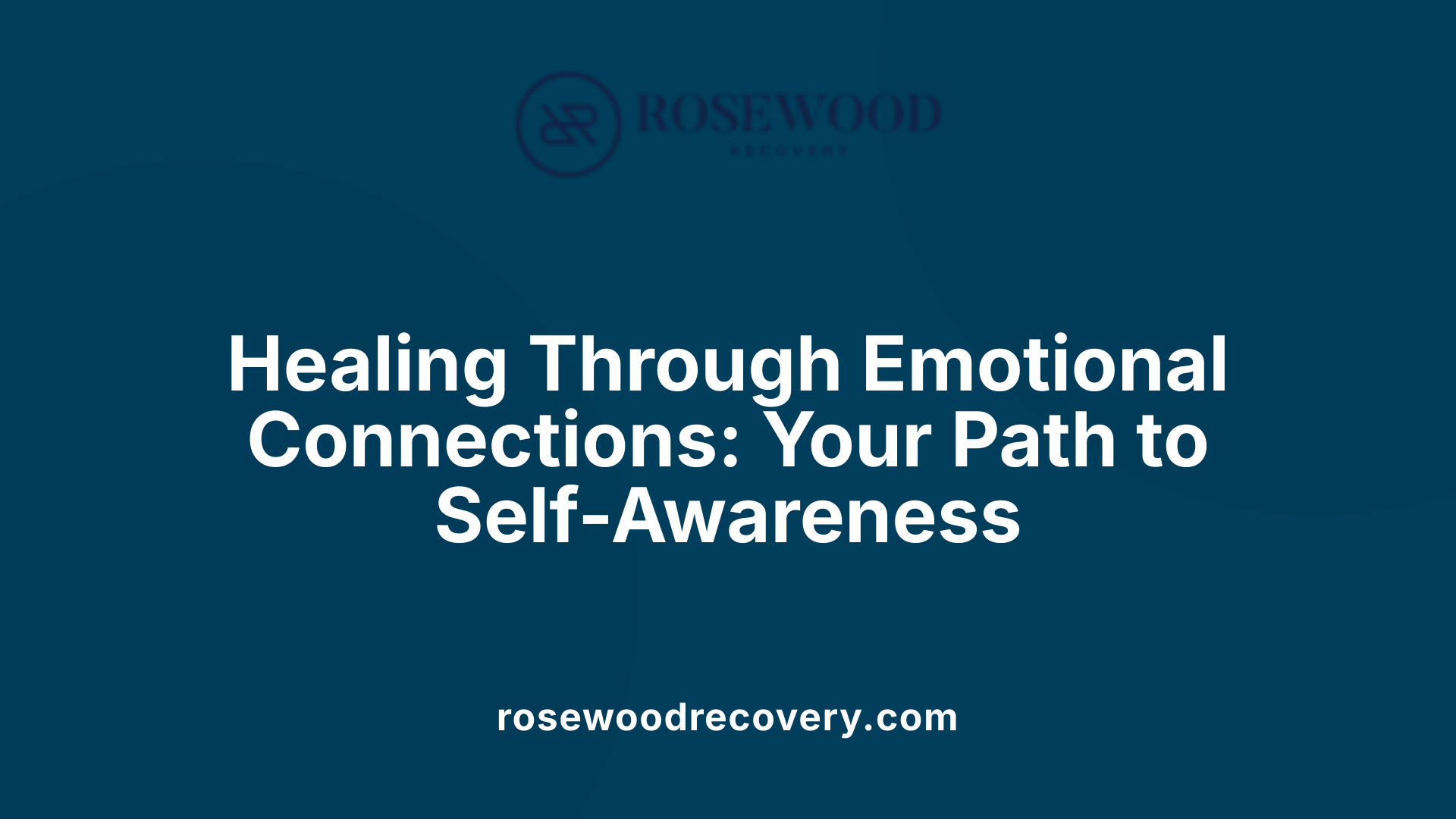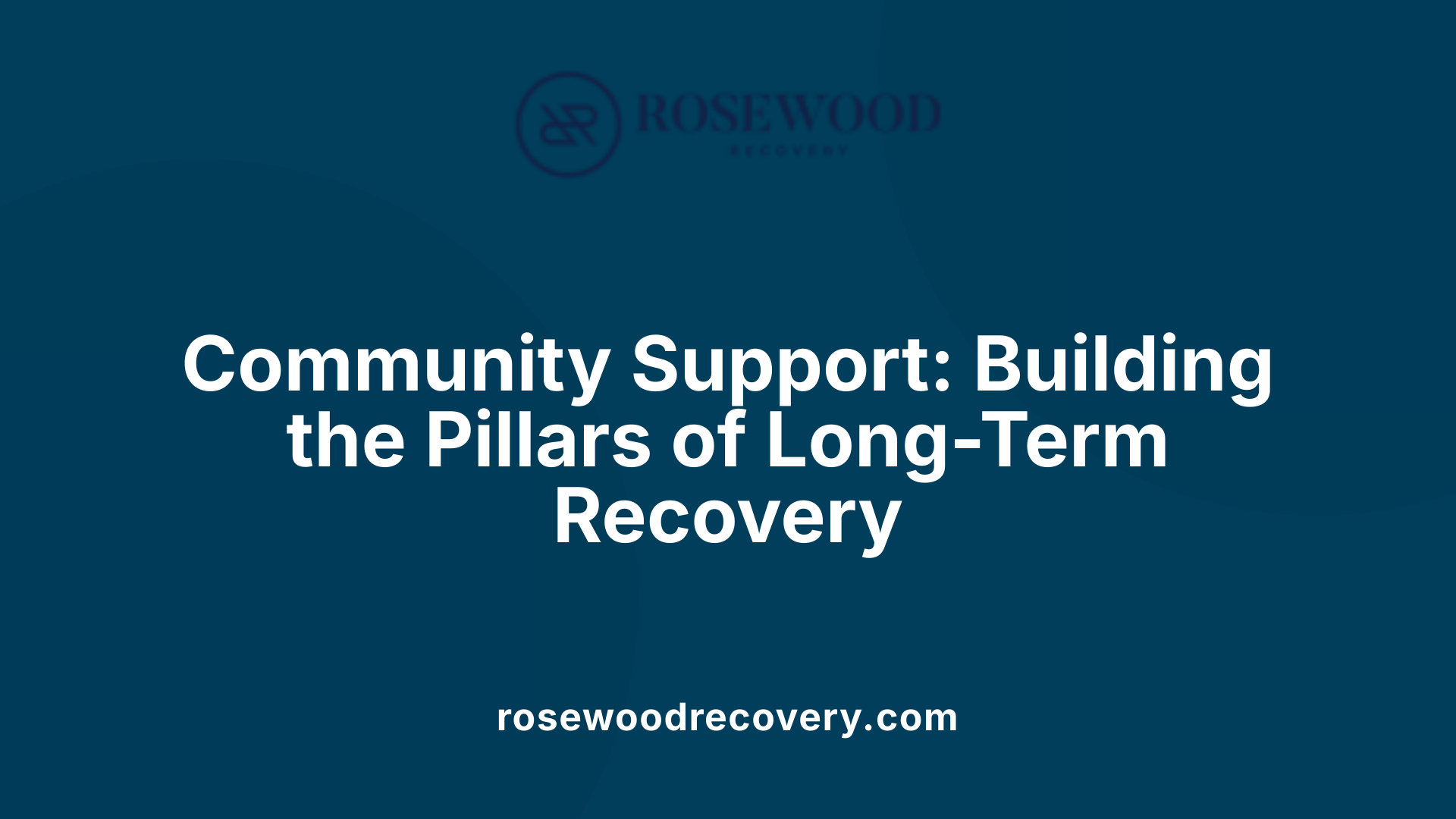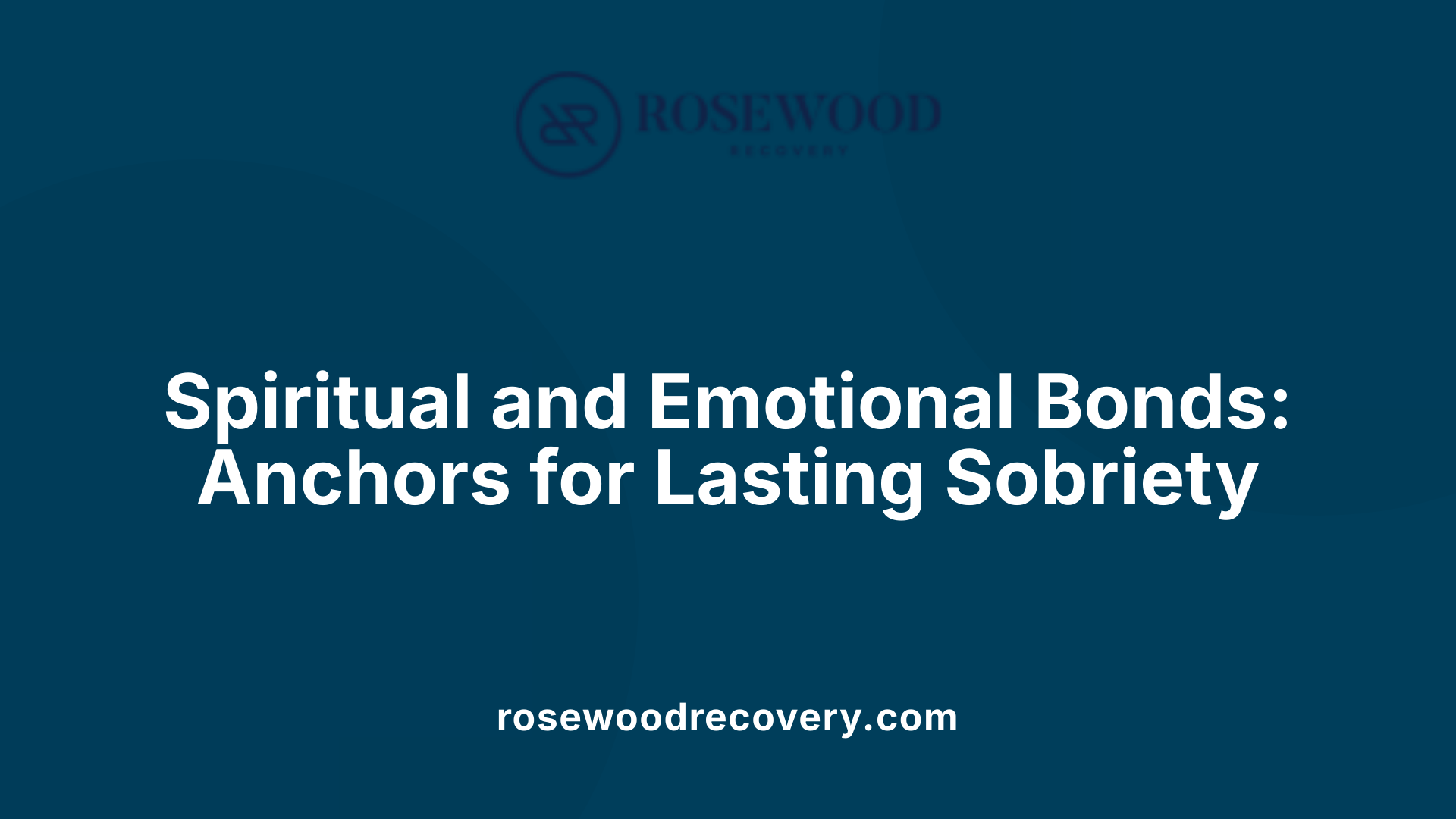Understanding the Role of Emotional Bonds in Recovery
Addiction is often characterized by a profound sense of isolation and disconnection. At its core, healing from addiction involves more than just addressing substance use—it requires rebuilding the emotional bridges that connect individuals to themselves, others, and a higher purpose. The significance of emotional connection in recovery cannot be overstated; it fosters trust, safety, and resilience—all vital components for lasting change.
The Foundations of Emotional Safety and Trust in Recovery

Why are relationships important in recovery?
Relationships form the bedrock of successful addiction recovery. They offer emotional safety, acceptance, and a sense of belonging—crucial elements that support sustained sobriety.
A safe, trusting environment encourages individuals to open up about their struggles, face old traumas, and rebuild their self-worth. When people feel seen, validated, and supported, they are more likely to engage actively in their recovery and less likely to relapse.
Healthy relationships are built on honesty, respect, and open communication, fostering mutual understanding and trust. Family, friends, support groups, and healthcare providers can all serve as vital sources of emotional support.
On the other hand, toxic or unstable relationships can trigger stress, anxiety, or shame, potentially leading to relapse. That’s why addressing relationship challenges and creating supportive social networks are integral parts of treatment programs.
Support groups like Alcoholics Anonymous (AA), therapy, and community initiatives foster sober connections, offering shared experiences and collective wisdom. These bonds help individuals feel less isolated and more resilient against relapse triggers.
In essence, nurturing positive relationships and establishing emotional safety set the foundation for healing and long-term sobriety.
Emotional bonds as catalysts for healing and self-awareness

What is the significance of emotional connections in addiction recovery?
Emotional bonds are fundamental in supporting individuals through the recovery journey from addiction. These connections fulfill the basic human need for love and belonging, which is often compromised during active substance use. When people feel emotionally safe and supported, they are more willing to open up about their struggles, face trauma, and confront feelings of shame.
Building genuine relationships with family, friends, or support groups creates an environment of trust and validation. Such bonds help individuals feel seen and understood, reducing stigma and fostering hope. Support systems like 12-step programs or community groups offer shared experiences that strengthen resilience, making it easier to maintain sobriety.
Moreover, emotional bonds facilitated through therapy and community engagement can enhance self-awareness. Increased understanding of oneself encourages healing, improves mental health, and supports the development of healthier coping mechanisms. Incorporating emotional and social connections into treatment greatly improves the chances of long-term recovery, fostering resilience and emotional stability.
In summary, meaningful emotional bonds act as vital catalysts for healing, self-discovery, and growth, ultimately empowering individuals to overcome the challenges of addiction and build a healthier, sober life.
Community and social support: pillars of lasting recovery

How do social bonds and community support aid in addiction treatment?
Social bonds and community engagement play a vital role in overcoming addiction. They provide emotional support, help reduce feelings of loneliness and shame, and create a sense of safety and trust. When individuals feel connected to others, they are more likely to share their struggles and seek help without fear of judgment.
Support networks such as family, friends, and peer groups serve as sources of encouragement and accountability. These relationships help individuals develop healthy coping strategies, manage triggers, and stay committed to their recovery goals. Engaging with community programs, especially recovery groups like 12-step meetings, offers shared experiences and collective wisdom.
Trusting these connections boosts confidence and motivation. Clients who feel understood and valued are more engaged in their treatment and are better equipped to face challenges.
Building supportive relationships with family and peers
Rebuilding family relationships requires honest communication, set boundaries, and often, family therapy. Supportive family involvement can enhance the recovery process by providing a stable emotional foundation.
Peer relationships, especially within support groups, foster a sense of belonging and mutual understanding. Sharing stories and listening to others’ experiences can inspire hope and resilience.
Developing these relationships involves active listening, empathy, and consistent support. When people are surrounded by caring individuals, they are less likely to relapse and more likely to develop lasting sobriety.
Impact of social support on relapse prevention
Strong social networks significantly reduce the risk of relapse. They provide emotional comfort during difficult times, practical assistance, and opportunities for positive social interactions.
Supportive environments help individuals learn healthier ways to handle stress and cravings. They also reinforce accountability and motivate continued participation in recovery activities.
Research shows that individuals with active social support systems have higher treatment retention rates and longer periods of sobriety.
Creating a community of understanding and compassion is essential. Whether through family, friends, or community groups, these connections form a resilient foundation for enduring recovery.
| Aspect | Benefits | Supporting Details |
|---|---|---|
| Emotional Encouragement | Boosts confidence and reduces shame | Peer groups and family members provide reassurance and understanding |
| Trigger Management | Reduce relapse triggers | Support networks help develop coping skills and provide accountability |
| Long-term Sobriety | Sustained motivation | Ongoing community involvement fosters resilience |
Ultimately, nurturing social bonds and participating actively in community support are fundamental in addiction recovery, guiding individuals toward a healthier, connected future.
The significance of emotional regulation and vulnerability
Why is emotional regulation important in addiction recovery?
Emotional regulation plays a vital role in addiction recovery because it helps individuals manage their feelings effectively. When emotions like anger, anxiety, or sadness become overwhelming, they can trigger cravings or impulsive behaviors that lead to relapse.
Techniques such as mindfulness meditation, Cognitive Behavioral Therapy (CBT), Dialectical Behavior Therapy (DBT), and emotion-focused therapies equip individuals with skills to recognize, understand, and modulate their emotional responses. These methods promote self-awareness and help in reducing emotional impulsiveness.
Developing emotional regulation also builds resilience against stress and external triggers. When a person can face difficult emotions calmly, they are less likely to seek relief through substance use. Addressing core emotional issues through openness and honesty allows for deeper healing.
By mastering emotional regulation, individuals can break free from the cycle of emotional dysregulation that often fuels addiction. This not only prevents relapse but also enhances overall mental health and stability.
Vulnerability as a tool for deeper connection
Vulnerability involves opening up about one's feelings and struggles in a safe environment. When met with compassion, vulnerability fosters genuine human connections.
In recovery, sharing feelings and experiences strengthens trust and creates a sense of being understood and supported. It encourages individuals to face their trauma and emotional pain rather than avoid it. Vulnerability allows for honest communication, which is crucial for rebuilding relationships and establishing healthy boundaries.
Creating space for vulnerability in therapy and support groups helps individuals develop deeper self-awareness. It also catalyzes emotional healing, making recovery more meaningful and sustainable.
Addressing core emotional issues through openness
Many emotional challenges linked to addiction, such as shame, guilt, and unresolved trauma, are better addressed through openness. Expressing feelings honestly helps to reduce emotional burden and promotes healing.
Sharing these core issues with trusted others—be it counselors, support groups, or loved ones—offers relief and validation. This openness can dismantle shame and stigma associated with addiction, fostering an environment for growth.
In conclusion, integrating emotional regulation practices and embracing vulnerability are essential components of effective addiction treatment. They empower individuals to confront and heal emotional wounds, build authentic relationships, and sustain long-term recovery.
Vulnerability and emotional bonds: keys to sustainable recovery
How do emotional bonds and vulnerability aid in overcoming addiction?
Emotional bonds and vulnerability are fundamental to the recovery process because they promote trust and honest self-reflection. When individuals open up and share their feelings in safe, compassionate environments, they create strong connections that foster safety and support.
Building genuine relationships with family, friends, peers, and support groups helps reduce feelings of isolation and stigma. These bonds provide emotional reinforcement, making individuals feel understood, valued, and supported, which strengthens their motivation to stay sober.
Vulnerability allows people to confront their inner struggles, face trauma, and discuss negative emotions like shame and guilt. This openness encourages healing on a deeper level, as it helps address underlying issues that often lead to substance use.
Moreover, being vulnerable makes it easier to seek help, communicate needs effectively, and accept support from others. This improved communication with loved ones and professionals increases the chances of successful treatment.
In clinical settings, cultivating emotional bonds and vulnerability can enhance therapy outcomes. It allows clients to explore and reframe their stories, fostering resilience and emotional regulation.
Overall, vulnerability and emotional ties help address the social and psychological roots of addiction, creating a solid foundation for long-lasting recovery. This process nurtures empathy, trust, and authentic connections—all vital in overcoming dependence and building a healthier, sober life.
Spiritual and emotional connections as anchors for sobriety

What role do spiritual and emotional connections play in maintaining sobriety?
Spiritual and emotional bonds are essential in supporting long-term recovery from addiction. They provide a sense of purpose, belonging, and inner strength, which are often challenged during the recovery process. Engaging in spiritual or faith-based practices like prayer, meditation, and community participation can help restore emotional stability and resilience.
Connecting with a higher power or divine presence offers individuals comfort and guidance, helping them navigate cravings and handle emotional upheavals. These spiritual practices foster hope and a sense of responsibility, motivating individuals to stay committed to sobriety.
Moreover, involvement in faith-based support groups enhances social connections, creating a network of understanding and encouragement. These bonds can strengthen emotional health and diminish feelings of isolation, which often trigger relapse.
Overall, cultivating spiritual and emotional relationships builds a solid foundation for mental health, resilience, and sustained sobriety. They reinforce the idea that recovery is not just about abstaining from substances but also about nurturing a supportive environment that promotes growth, healing, and hope.
Embracing Connection for Lifelong Sobriety
The journey of overcoming addiction is deeply rooted in forming and nurturing meaningful emotional and social bonds. These connections foster trust, safety, and vulnerability—elements that are essential for healing emotional wounds, building resilience, and maintaining long-term sobriety. By prioritizing emotional safety, embracing vulnerability, and engaging in supportive communities, individuals can transform their recovery experience into a profound, ongoing process of self-discovery and connection. Ultimately, lasting sobriety is not just about abstinence but about cultivating a nourishing environment where love, trust, and spiritual growth flourish. Reconnection with oneself, others, and a higher purpose forms the cornerstone of enduring healing.
References
- Why Emotional Connection Matters in Addiction Recovery
- The Importance of Making Connections in Recovery - AToN Center
- Building and Managing Personal Relationships in Addiction Recovery
- Human Connection is the Answer to Treating Addiction
- Depression, Anger, & Addiction: The Role of Emotions in Recovery
- 10 Ways Social Support Affects Addiction Recovery
- Finding Emotional Connection In Recovery | Healing Pines




